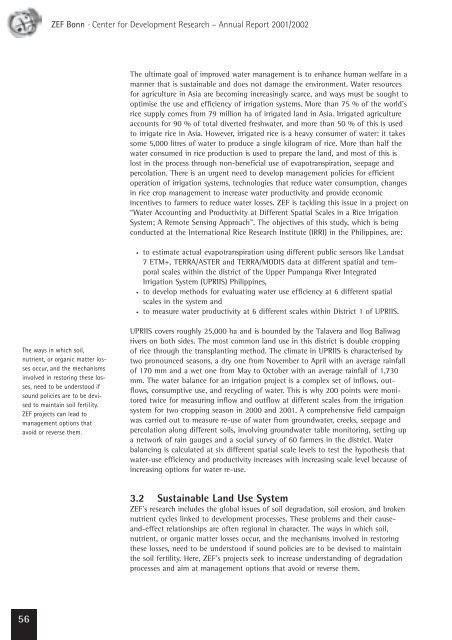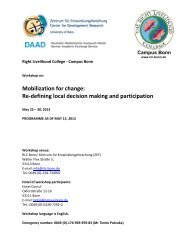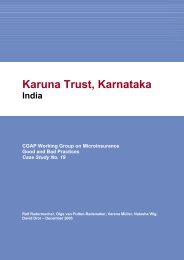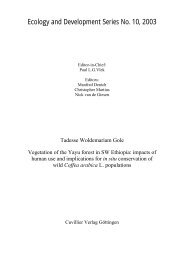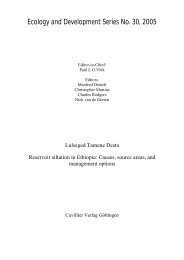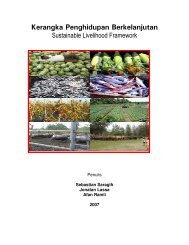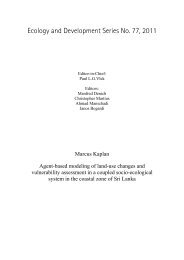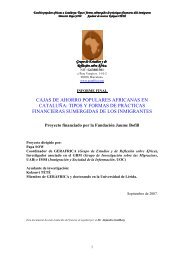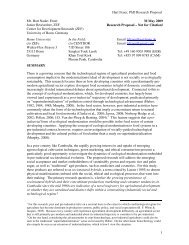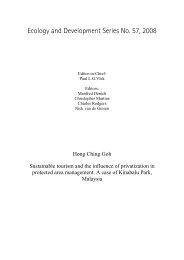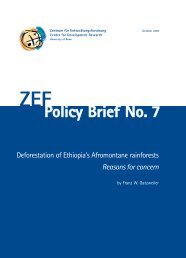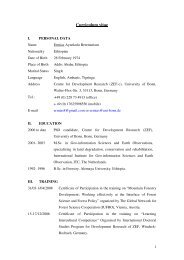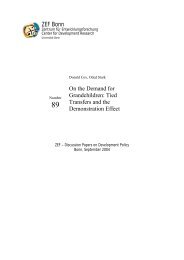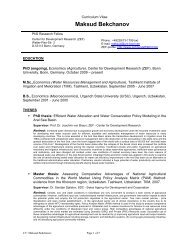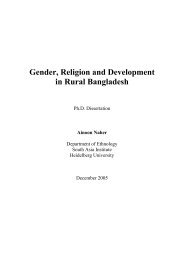ZEF Bonn
ZEF Bonn
ZEF Bonn
You also want an ePaper? Increase the reach of your titles
YUMPU automatically turns print PDFs into web optimized ePapers that Google loves.
56<br />
<strong>ZEF</strong> <strong>Bonn</strong> ● Center for Development Research – Annual Report 2001/2002<br />
The ways in which soil,<br />
nutrient, or organic matter losses<br />
occur, and the mechanisms<br />
involved in restoring these losses,<br />
need to be understood if<br />
sound policies are to be devised<br />
to maintain soil fertility.<br />
<strong>ZEF</strong> projects can lead to<br />
management options that<br />
avoid or reverse them.<br />
The ultimate goal of improved water management is to enhance human welfare in a<br />
manner that is sustainable and does not damage the environment. Water resources<br />
for agriculture in Asia are becoming increasingly scarce, and ways must be sought to<br />
optimise the use and efficiency of irrigation systems. More than 75 % of the world's<br />
rice supply comes from 79 million ha of irrigated land in Asia. Irrigated agriculture<br />
accounts for 90 % of total diverted freshwater, and more than 50 % of this is used<br />
to irrigate rice in Asia. However, irrigated rice is a heavy consumer of water: it takes<br />
some 5,000 litres of water to produce a single kilogram of rice. More than half the<br />
water consumed in rice production is used to prepare the land, and most of this is<br />
lost in the process through non-beneficial use of evapotranspiration, seepage and<br />
percolation. There is an urgent need to develop management policies for efficient<br />
operation of irrigation systems, technologies that reduce water consumption, changes<br />
in rice crop management to increase water productivity and provide economic<br />
incentives to farmers to reduce water losses. <strong>ZEF</strong> is tackling this issue in a project on<br />
“Water Accounting and Productivity at Different Spatial Scales in a Rice Irrigation<br />
System; A Remote Sensing Approach". The objectives of this study, which is being<br />
conducted at the International Rice Research Institute (IRRI) in the Philippines, are:<br />
● to estimate actual evapotranspiration using different public sensors like Landsat<br />
7 ETM+, TERRA/ASTER and TERRA/MODIS data at different spatial and temporal<br />
scales within the district of the Upper Pumpanga River Integrated<br />
Irrigation System (UPRIIS) Philippines,<br />
● to develop methods for evaluating water use efficiency at 6 different spatial<br />
scales in the system and<br />
● to measure water productivity at 6 different scales within District 1 of UPRIIS.<br />
UPRIIS covers roughly 25,000 ha and is bounded by the Talavera and Ilog Baliwag<br />
rivers on both sides. The most common land use in this district is double cropping<br />
of rice through the transplanting method. The climate in UPRIIS is characterised by<br />
two pronounced seasons, a dry one from November to April with an average rainfall<br />
of 170 mm and a wet one from May to October with an average rainfall of 1,730<br />
mm. The water balance for an irrigation project is a complex set of inflows, outflows,<br />
consumptive use, and recycling of water. This is why 200 points were monitored<br />
twice for measuring inflow and outflow at different scales from the irrigation<br />
system for two cropping season in 2000 and 2001. A comprehensive field campaign<br />
was carried out to measure re-use of water from groundwater, creeks, seepage and<br />
percolation along different soils, involving groundwater table monitoring, setting up<br />
a network of rain gauges and a social survey of 60 farmers in the district. Water<br />
balancing is calculated at six different spatial scale levels to test the hypothesis that<br />
water-use efficiency and productivity increases with increasing scale level because of<br />
increasing options for water re-use.<br />
3.2 Sustainable Land Use System<br />
<strong>ZEF</strong>'s research includes the global issues of soil degradation, soil erosion, and broken<br />
nutrient cycles linked to development processes. These problems and their causeand-effect<br />
relationships are often regional in character. The ways in which soil,<br />
nutrient, or organic matter losses occur, and the mechanisms involved in restoring<br />
these losses, need to be understood if sound policies are to be devised to maintain<br />
the soil fertility. Here, <strong>ZEF</strong>'s projects seek to increase understanding of degradation<br />
processes and aim at management options that avoid or reverse them.


